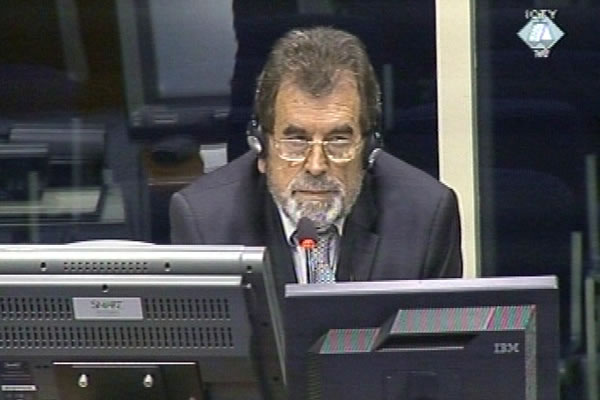Home
INVISIBLE PRESIDENT
Savo Strbac, former secretary in the Republic of Serbian Krajina cabinet and president of the Commission for Exchange of Prisoners, has described President Goran Hadzic as having minimum powers and making rare appearances. Instead of attending government meetings where he wasn’t expected in the first place, Hadzic would claim he had not been able to travel from Vukovar to Knin because of the war
 Savo Strbac, defence witness at Goran Hadzic trial
Savo Strbac, defence witness at Goran Hadzic trial Vojin Susa, former justice minister in the government of the SAO Eastern Slavonia, completed his evidence. Goran Hadzic’s defense called its next witness, Savo Strbac. He was the cabinet secretary in the so-called Republic of Serbian Krajina. Prime minister Djordje Bjegovic, who formed the government in April 1993, invited Strbac in. In addition to dealing with technical issues, Strbac was in charge of the Commission for the Exchange of Prisoners and Mortal Remains. Strbac later founded Veritas, a non-governmental organization whose mission was to document the persecution, suffering and the destruction of property of the citizens of the RSK during and after the war. The NGO is still operational.
In his evidence, he spoke about some paragraphs in his statement to the defense. In the second part of his evidence, he spoke about the operations launched by the Croatian Army, the Miljevac Plateau operation in 1992 and the Maslenica and Medak Pocket operations in 1993. Strbac also talked about the exhumation and identification of the victims’ remains. In the second part of his evidence, Strbac spoke in detail about the powers of the judicial and executive bodies of the Republic of Serbian Krajina. In peacetime, the Assembly appointed judges and prosecutors, Strbac explained, but after the Maslenica operation, the state of an imminent threat of war was declared, and in line with the Constitution, those powers were transferred to the president who in turn delegated them to the government.
Strbac said that RSK president Hadzic rarely attended government meetings; in fact, he wasn’t ‘even expected’ to do so. The witness added that after the Medak Pocket Operation in September 1993, prime minister Bjegovic called Hadzic no less than six times to come to Knin. Hadzic declined the invitation, saying that Banja Luka, which was en route from Vukovar to Knin was surrounded by the Serb army tanks.
In a bid to define the powers of the Republic of Serbian Krajina president, defense counsel Gosnell showed several documents, including the minutes from the 46th session of the RSK government from May 1993. At the session, the government ‘took the position’ that ‘the justice ministry will draft a final version of the text on the general Serb assembly’. Strbac explained that Hadzic wasn’t mentioned at the session because ‘the president was not consulted much when it came to the issues of that kind’. The defense counsel then referred to the provisions of the Constitution which stipulated that the president of the Republic in peacetime could only ‘propose’ the dismissal of government ministers. Strbac confirmed that. Another provision stipulated that the government and its members ‘are accountable for their work to the president of the Republic and the Assembly’. Strbac explained that in practice that ‘was not the case’. ‘In my opinion, Hadzic didn’t interfere in the government’s work’, Strbac noted, adding that Hadzic for the most part did not use the powers vested in him by the Constitution.
In the subsequent paragraphs of his statement, Strbac talked about the criteria used to establish who would be granted permission to leave the RSK. Croats came to his law office and asked to be allowed to cross the demarcation line, Strbac said, because they felt ‘insecure’ and scared. Also, Croats would claim that they had received threats or that they had relatives on the other side, and Strbac tried his best to meet their demands. As he explained, after the Croatian military operations there were many Serb refugees. The people who ‘came into the area and who had to leave their property behind on the Croat side’ were a real risk, and people tried to ‘make arrangements’ to exchange their property. In Strbac’s words, they would encourage each other, saying ‘it is all just for the time being’, because the important thing was to ‘stay alive, who cares about property’. At the end of today’s testimony Strbac described two methods used in prisoner exchanges: ‘all for all’ or ‘one for one’.
Savo Strbac continues his testimony tomorrow.
Linked Reports
- Case : Hadzic
- 2014-10-14 SUSA: OVCARA WAS TRAGEDY FOR FAMILIES AND SERB NATION
- 2014-10-13 HOW CROATS WERE MOVED OUT AND SERBS RESETTLED TO ACHIEVE SERB MAJORITY
- 2014-10-10 JUDICIAL PRIORITIES
- 2014-10-16 SHEPHERDS EXCHANGED FOR PRISONERS, SHEEP BURIED IN OVCARA
- 2014-10-20 HADZIC ABSENT ON TUESDAY
- 2015-01-23 EXPERTS ASKED TO EVALUATE HADZIC’S HEALTH
